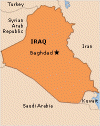Iraq, Coleman, and Minnesotans’ Views on the War

Norm Coleman has taken specific measures during the last few months to distinguish himself from his Republican Party that has by and large backed President George W. Bush’s efforts in the War in Iraq during the past 3+ years. In January Coleman was quick to relay concerns about the President’s plan to send an additional 21,500 troops to Iraq. This month he broke with his Party’s leadership by trying to bust a GOP filibuster to prevent a floor debate on a resolution criticizing that troop build-up.
Many commentators have speculated that Coleman (along with other GOP Senate incumbents up for election in 2008) is strategically framing his positions on Iraq much more in line with his constituency which, along with most of America, has become increasing critical of Bush’s handling of the war and skeptical of the reasons for which it was started.
To the extent Coleman needs to answer his critics and skeptics, he will have that opportunity on the campaign trail next year if not before. The question Smart Politics investigates today is the extent to which Minnesota has soured on the Iraq campaign.
The most recent Minnesota Poll data from October 2006 found those Minnesotans viewing the United States’ efforts to bring stability and order to Iraq as going badly outnumbered those who viewed it as going well by a 2.5 to 1 margin: 70 percent to 28 percent. That is a moderate increase from nearly two years prior when 58 percent viewed the U.S. effort as going badly, compared to 39 percent who viewed it as going well (MN Poll, January 2005). Nearly one year into the campaign the numbers were reversed: 64 percent positive versus 34 percent negative (MN Poll, December 2003).
Minnesotans are also quite critical of President Bush’s handling of the war. In four polls conducted by the Minnesota Poll in 2003 Bush averaged an Iraq approval rating of 61 percent. In 2004, Bush’s Iraq approval rating dropped noticeablely to 42 and 40 percent in two Minnesota Poll’s taken late in that year’s presidential campaign. Bush’s rating on Iraq also dropped from 49 percent in a 2004 MPR / Pioneer press poll to just 26 percent last autumn (MPR / Pioneer Press Poll, September 2006).
What do Minnesotans want the U.S. to do about what the vast majority view as a poorly handled situation in Iraq? A September 2006 MPR / Pioneer Press poll found 55 percent supporting the establishment of a timetable for the withdrawal of troops, with 35 percent opposed to such a strategy.
It is impossible to say how events will unfold in Iraq during the next two years, or whether or not the Iraq war will be the most important issue to Minnesotans when casting their vote for Senator in 2008. It is quite unlikely, however, that the issue will be off the table, and, as such, decisions and statements made now by Coleman and whomever the DFL nominee will be in 2008 are certainly going to be scrutinized down the road.
